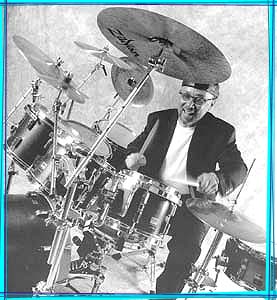![[Metroactive Music]](/music/gifs/music468.gif)
[ Music Index | Metro | Metroactive Central | Archives ]
At Schnalle's 'Place'
 Rhyme Schemer: Wally Schnalle speaks fluently in many genres with his drums.
Rhyme Schemer: Wally Schnalle speaks fluently in many genres with his drums.
Local drummer takes his own steps on new DIY album, 'That Place' By Nicky Baxter LIGHTNING-FAST LICKS, sleight-of-hand stickwork or pummeling power displays--Wally Schnalle is capable of doing all those things and more. What sets him apart from the pack, however, is his unerring musicality, his ability to make his drums speak in multiple tongues--fluently. Most importantly, he is committed to musical growth. Over the years, Schnalle has worked his drum magic in a variegated assortment of musical settings. He has banged out in-the-pocket beats in hip-hop formations, generated multidirectional pulses in avant-garde ensembles and delved into deepest African drum-speak. What's more, Schnalle mines these divergent grooves without caving into sonic colonialism. Best of all, despite possessing a résumé that is as impressive as it is lengthy, the 41-year-old drummer and composer continues to evolve. On record, that evolution began with the musical crazy quilt that was the drummer's debut, It Rhymes. That album wandered all over the musical map, bouncing from peppy hip-hop-derived beat-keeping to Afri-Latin tropicalia to chart-smart pop jazz stylings. Why Do They Call You That?, Schnalle's sophomore effort, found the artist exploring rhythms from Africa, the Caribbean and black Latin America. Tracks like "Kwaku" acknowledged Schnalle's indebtedness to West Africa's melodic, multirhythmic music. "On the first album," Schnalle recalls, "I played every style I could think of. To some degree, it was kind of market-driven." As his playing and compositional acumen have evolved, Schnalle no longer feels as compelled to play what radio programmers want to hear. Still, even on those early efforts, Schnalle's inventive, energetic playing shines through. Not coincidentally, his favorite time-keepers--Elvin Jones, Jack DeJohnette and the late Tony Williams--all carved out resolutely distinctive styles. Since Williams' tragically premature passing, Schnalle has come to appreciate his artistry even more. "I went back and started listening really closely to Tony when he was with Miles and then his solo stuff," Schnalle says, "and not only was he a great drummer, but also I came to realize what a great composer and bandleader he was." "Tony" and "Red & Yellow Sivad," tracks from Schnalle's new release, That Place, pay homage to the prodigiously gifted drummer. That Place is another evolutionary step forward. Released on Schnalle's own Retlaw label, the disc provides a vivid snapshot of the drummer's current interests. A DIY affair built from the ground up, the album was recorded, mixed and produced by Schnalle in his home studio. The album showcases 11 original tunes as well as a new band. HIS CURRENT CREW--saxophonist Charles McNeal, pianist Jeff Pitson and bassist Rob Fisher--has been around the block a few times, having traded fire with such improvisational-music standard-bearers as Joe Henderson, Larry Coryell and Poncho Sanchez. "These are great players," Schnalle says of his new band. "This band really allows me to take the music where I wanted it to go." On That Place, the quartet infuses postbop with new life. The high points are many, ranging from the visceral beauty of "Tony" to the moody balladry of "It Could Have Been Me" to the complex pretzel logic of "Patio Walk." The last tune started out as a riff that Schnalle couldn't shake. By the time it had made its way onto the album, "Patio Walk" had been transformed into a bluesy romp on the wild side, replete with shifting time changes governed by the bandleader's coolly insistent cymbal and snarework. Schnalle credits Elvin Jones with inspiring the song's overall form. Jones' influence is also apparent on "Sweet Art," the album's concluding track. Schnalle is all over the place, alternately riding the rhythm and propelling it forward. His introductory and concluding solos are models of multitiered rhythmic intensity. His bandmates respond with some inspired handiwork of their own; McNeal's saxophone underscores and embellishes the tune's rhythmic motif, adding emotional heft. Before he prepares to head off to a drumming class he teaches, Schnalle offers a nugget of wisdom to prospective improv players, which also sums up his own outlook: "For me, it's about evolution, always striving to grow. My advice is to enjoy the ride. And part of enjoying the ride is growing and learning."
Wally Schnalle performs Wednesday (March 31) at 9pm at Fuel, 44 Almaden Ave., San Jose. Cover varies. (408.295.7374) [ San Jose | Metroactive Central | Archives ]
|
From the March 25-31, 1999 issue of Metro.
Copyright © Metro Publishing Inc. Maintained by Boulevards New Media.